The Dell Chromebook 11 Touch Review
by Brandon Chester on May 7, 2015 8:00 AM EST- Posted in
- Laptops
- Chrome OS
- Chromebook
Web Performance
Due to the limitations of Chrome OS, we're mostly limited to browser benchmarks to characterize performance. It's a similar situation to mobile benchmarking, which I commonly describe as less than optimal. However, since essentially everything a user will do on a Chrome OS device is done through Chrome, it's actually a fairly good indication of the performance they'll see on a given device.
Like the Toshiba Chromebook 2, the Dell Chromebook 11 being reviewed uses Intel's Celeron N2840. Unlike Intel's more expensive Celeron parts which use their Haswell architecture, N2840 uses Silvermont cores much like Intel's Atom parts in the Bay Trail line. Because of this, users should expect performance closer to that of higher end ARM chips and Intel Atom SoCs than that of Intel's Haswell based Celeron parts.
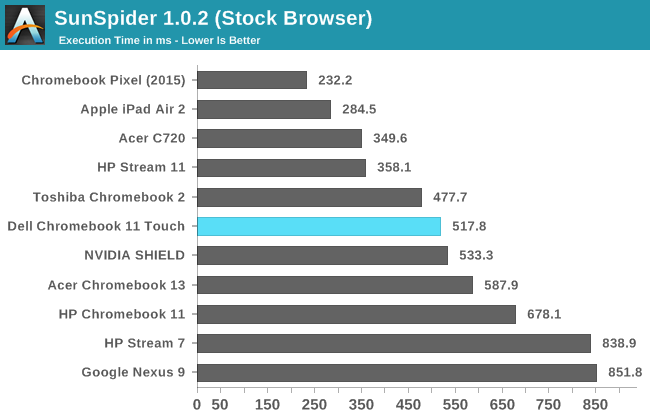
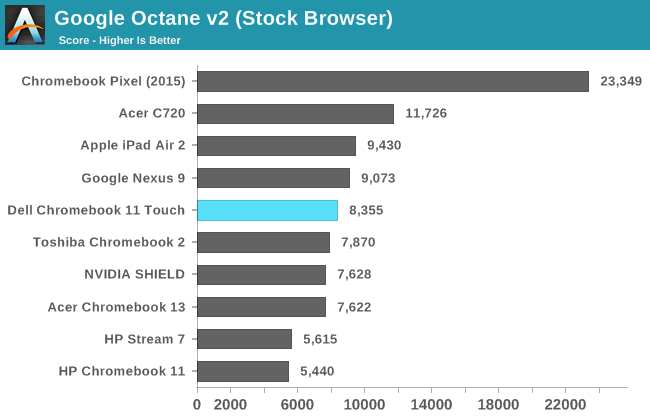
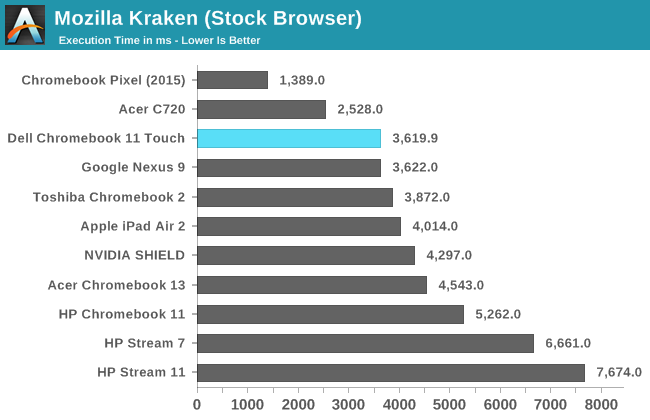
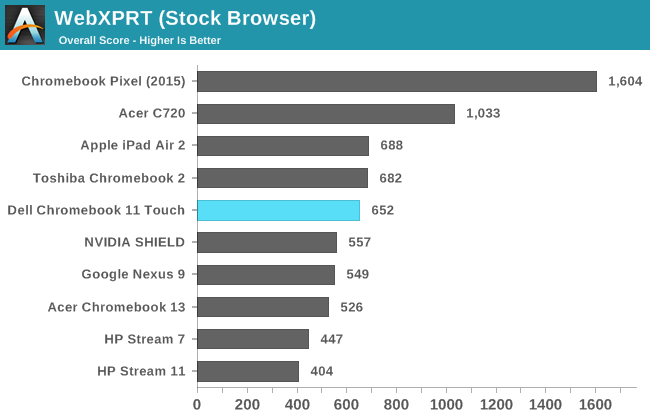
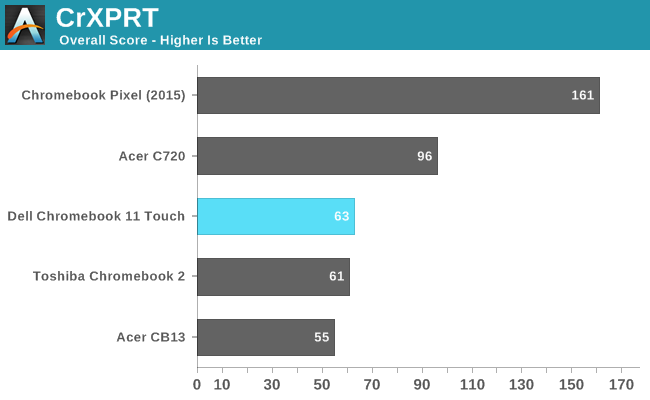
In all of our benchmarks, the Dell Chromebook 11 gets roughly the same results as the Toshiba Chromebook 2. There are some minor differences which can be attributed to variance in scores between tests, as well as updates that have been made to Chrome OS since previous reviews. When using the Dell Chromebook 11 it never seemed to struggle, and I think that users will have all the speed they need to do their work on the web even if the CPU doesn't offer class leading performance.
WiFi Performance
Since Chromebooks are devices that are primarily used to browse the web, it's important to have good WiFi performance. Most inexpensive Chromebooks opt for 802.11n, and sometimes don't even include support for the 5GHz band. Because the Dell Chromebook 11 is more of a mid range Chromebook, it includes support for dual spatial stream 802.11ac which is pretty much as good as it gets for laptop WiFi, with the exception of a few 3x3 devices that are on the market.
While there's no way to test WiFi performance in Chrome OS, it can be accomplished via other means with the use of Linux and iPerf. I'm hoping to eventually bring our laptop WiFi performance test from Windows to Linux in order to get TCP results that are comparable to those in our standard laptop reviews, but for now I've just put the Dell Chromebook 11 through the UDP performance test that we use in mobile reviews.
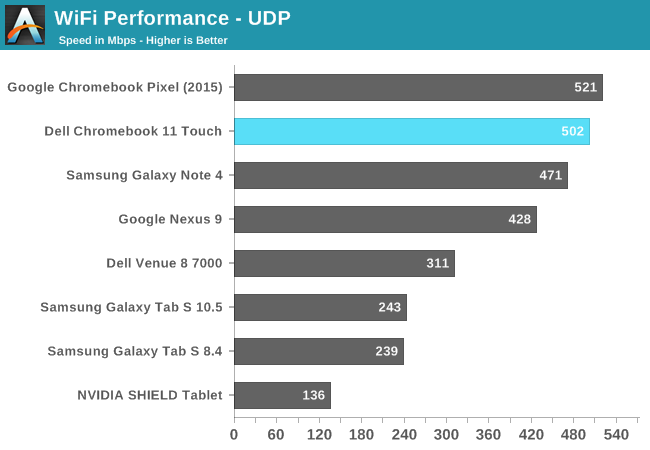
With a maximum speed of 502Mbps, the Dell Chromebook 11 is beaten only by the Chromebook Pixel. I wish I had more Chromebook data points here, but this is a test that I introduced for our Chromebook reviews and this is only my second review of one. Regardless, I don't suspect that users will have any complaints about the WiFi performance on the Dell Chromebook 11.










46 Comments
View All Comments
Hulk - Thursday, May 7, 2015 - link
Can we just get to the point where anything but an IPS display or other wide angle variant is a non-starter?I love the fact that Anandtech devotes a whole page just to the display and tells it like it is. I'll sum it up. The display on this unit sucks.
RichieHH - Thursday, May 7, 2015 - link
One can only assume the reviewer got to keep his test machine. Biased , drooling fanboi nonsense.PPalmgren - Thursday, May 7, 2015 - link
Not that it applies to this situation, but I avoid IPS like the plague because of gaming input lag. TN still has its niche there.Death666Angel - Friday, May 8, 2015 - link
Input lag is only determined by the electronics working in the background, not the display technology. What you mean is pixel response time (black to white and grey to grey), which gives TN the edge most of the time.lilmoe - Thursday, May 7, 2015 - link
Ughhhhhh.... ChromeBooksRichieHH - Thursday, May 7, 2015 - link
Once again nonsense about netbooks. "Incredibly slow" hard drives are another option to cloud storage. As for the nonsense about low resolution : depends on which you buy and when etc. Choice. Chromebooks are , for me, the Emperor's New Clothes. They can do nothing a good laptop or netbook can't do. Why limit yourself. Poor review which made clear it's bias on the opening lines.LetsGo - Thursday, May 7, 2015 - link
Again another power user who thinks everyone is the same.Chromebooks biggest advantage is easy maintence and ease of use.
It is practical impossible for an user to mess up.
I bought my Mum a netbook to do her documents etc on and had to fix it for her even though I put virus checker on it for her.
So I bought her a chromebook to replace it. Months later I asked her how she was getting on with it.
It comes on fast was her response I have had no trouble getting my work done.
Chromebook type devices are the future along with tablets....
nikon133 - Thursday, May 7, 2015 - link
At least with slow netbook HDD, I could dump images from my camera while away from home, with no dependence on Internet availability (or costs). Cameras get lost, stolen, dropped into sea, damaged... I found it always a good precaution to backup photos to computer.As it is, I'm really finding very little value in Chromebooks. A modern version of netbook, with current 4C Atom (or Celeron), HDD (that can be swapped to SSD) and full OS would be much more preferable solution. Also, something like new MS Surface 3 makes much more sense to me than Chromebook. Yes, it is more expensive, but with usable storage, much better screen, full OS (and available software library), usable 8MP camera, tablet mode and a year of Office365/on-line storage.
SM123456 - Thursday, May 7, 2015 - link
I don't understand why you think you need to carry around a hot and heavy Windows laptop with a short battery life everywhere with you just to back up photos. Besides the fact that you can also save onto a Chromebook's SSD, the obvious thing that anyone with any common sense would do is to save the photos from the camera directly onto an SD card or memory stick.What you are doing is scroogling my friend.
jabber - Friday, May 8, 2015 - link
Yeah I managed on holiday just fine with my DSLR and Samsung Chromebook. Copying photos off the SD card, viewing them on the Chromebook and backing them up to USB. All works perfectly. No need for a full blown heavy Windows laptop or Macbook.RicheHH/Nikon33 stop showing up your lack of hardware knowledge, it's just embarrassing.
Plus Chromebooks are far far superior to netbooks. Netbooks were the pox.